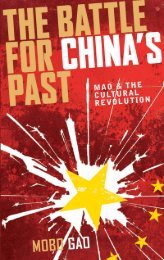Adam Smith's Critique of International Trading ... - Political Theory
Adam Smith's Critique of International Trading ... - Political Theory
Adam Smith's Critique of International Trading ... - Political Theory
You also want an ePaper? Increase the reach of your titles
YUMPU automatically turns print PDFs into web optimized ePapers that Google loves.
Muthu / Smith’s <strong>Critique</strong> <strong>of</strong> <strong>International</strong> <strong>Trading</strong> Companies 203<br />
they failed to produce conditions that brought about genuine communicative<br />
and commercial liberties across borders. Smith’s understanding <strong>of</strong> the<br />
modern world was that it fostered the distinctively human capacity for<br />
interaction and exchange, which all societies in their laws and practices<br />
ought to honor, in an astonishingly far-reaching and historically unprecedented<br />
manner, “uniting, in some measure, the most distant parts <strong>of</strong> the<br />
world” (IV.vii.c.80; 626). Yet Smith’s arguments show that this very capacity<br />
was also degraded as a result <strong>of</strong> the way in which globalization developed,<br />
and not only in light <strong>of</strong> the “dreadful misfortunes” that non-European<br />
societies suffered (IV.vii.c.80; 626). A significant portion—though not typically<br />
the most interpreted sections—<strong>of</strong> the Wealth <strong>of</strong> Nations aims to analyze<br />
what went wrong and attempts to show in great detail how even the<br />
most powerful, imperial, slave-trading, and company-driven nations themselves<br />
suffer far more costs than gain benefits as a result <strong>of</strong> the system <strong>of</strong><br />
global commerce that they put into place.<br />
Smith’s defense <strong>of</strong> the freedom <strong>of</strong> commerce is linked to an ideal <strong>of</strong> a<br />
global plurality <strong>of</strong> independent and interactive agents. What <strong>of</strong>ten lies behind<br />
his concerns about international joint stock companies, monopolies, guilds,<br />
churches, and states is an aversion to the excessive concentration <strong>of</strong> power,<br />
whether it is held by governments or nonstate institutions, since this <strong>of</strong>ten<br />
leads to the severe abuse <strong>of</strong> those who are unfortunate enough to become<br />
subject to such power. Overall, for Smith, the most pernicious threats to commercial<br />
liberty, which are threats ultimately to human welfare and to the communicative<br />
and sociable aspects <strong>of</strong> humanity itself, arise most <strong>of</strong>ten when<br />
institutions become bolstered by—or, in egregious cases, when such institutions<br />
themselves effectively capture—modern governments.<br />
In Smith’s analysis, the development <strong>of</strong> global relations both helped to<br />
create and depended upon such concentrations <strong>of</strong> power. Yet could global<br />
commerce nonetheless, in Smith’s opinion, help to bring about at least<br />
some small share <strong>of</strong> global justice? There is no doubt that Smith was deeply<br />
pessimistic about whether joint stock companies, and the vast system <strong>of</strong><br />
global inequality and corruption that they helped to build in league with<br />
their client states, could ever be challenged effectively from within<br />
European countries. 36 Smith argues emphatically, in a discussion about<br />
European colonial policy, that the British colonies in America—and, by<br />
implication, the public interest <strong>of</strong> both European and non-European nations<br />
more broadly—have been “sacrificed to the interest <strong>of</strong> those merchants,”<br />
namely, the merchants <strong>of</strong> the international trading companies (IV.vii.b.49;<br />
584, emphasis added). Smith understood that such companies and their<br />
governmental allies would not easily be reformed. Of course, eliminating
















